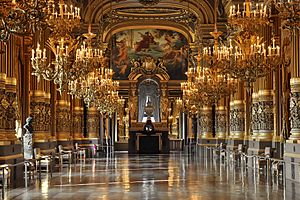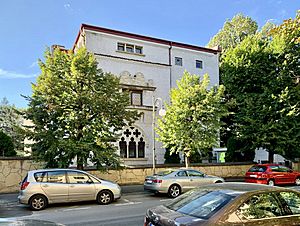Eclecticism facts for kids

Eclecticism is a way of thinking or creating that doesn't stick to just one idea or style. Instead, it takes the best parts from many different ideas, theories, or styles. It's like picking your favorite ingredients from different recipes to make a brand new dish!
Sometimes, people might think eclecticism looks a bit messy or not perfectly neat. Those who use this approach might be criticized for not always being consistent. However, eclecticism is actually very common in many areas of life and study. For example, many psychologists use ideas from different theories to understand human behavior, rather than just one.
In areas like ethics, philosophy, politics, and religion, eclecticism is also known as syncretism.
Contents
Where Did the Idea Come From?
The idea of eclecticism first appeared with some ancient Greek and Roman thinkers. These philosophers didn't follow one strict system. Instead, they chose ideas from different existing philosophies that seemed most sensible to them. They then combined these chosen ideas to create their own new way of thinking.
The word "eclectic" comes from the Greek word eklektikos. This word means "choosing the best." It comes from eklektos, which means "picked out" or "selected."
Some well-known eclectic thinkers in Greek philosophy were Panaetius and Posidonius. Among the Romans, Cicero was a famous eclectic. He combined ideas from different schools of thought. Antiochus of Ascalon, who taught Cicero, also helped move philosophy towards eclecticism. Other important eclectics included Varro and Seneca the Younger.
Even though eclecticism started in Greece, the term wasn't always used positively. Some historians saw it as a sign of ideas that weren't pure or original. However, other scholars believed that eclecticism had a long history in Greek philosophy. They thought it showed that all good ideas, no matter where they came from, were parts of a larger truth.
How is Eclecticism Used?
In Buildings and Art


The term eclecticism is often used to describe buildings and art. It means combining parts from different historical styles into one single work. This was very popular in 19th-century architecture, after the neoclassicism period (around 1820). Buildings from this time often mixed elements from Baroque, Rococo, or Gothic styles.
Eclecticism is important when we talk about and judge art. However, its exact meaning can be a bit unclear. The simplest idea is that every artwork combines different influences. But eclecticism is not a specific movement or style itself. It's more about the act of mixing different styles.
In Martial Arts
Some martial arts can be called eclectic. This means they borrow techniques and moves from many different martial arts styles. They combine these techniques to create a new, unique fighting system.
In Studying Old Texts
In the study of old texts, like ancient books or manuscripts, eclecticism means looking at many different copies of a text. Then, scholars choose the parts that seem to be the most accurate or best version. The final text is put together using readings from many different copies. This way, no single copy is favored over others.
Since the mid-1800s, this "eclectic" method has been the main way to edit the Greek text of the New Testament. Scholars look at all available old manuscripts to create the most reliable version.
In Philosophy
In Hellenistic philosophy, the Eclectics were philosophers who used ideas from many different philosophies. They also drew from texts, life experiences, and their own thoughts. These ideas covered topics like existence, knowledge, values, and the mind. This approach is closely linked to Middle Platonism.
Antiochus of Ascalon (around 125–69 BC) was a key figure. He taught Cicero and helped shift Platonism towards eclecticism. Antiochus believed that without strong ideas, a rational life wasn't possible. He showed how different philosophical schools, like those of Aristotle and Zeno of Citium, were actually quite similar in many ways. Antiochus was very interested in ethics, trying to find a middle ground between different ideas of happiness and virtue.
This eclectic way of thinking was possible because many of Plato's works didn't have strict rules. Middle Platonism also needed to consider new ideas from other schools of thought, like Aristotle's logic.
In modern philosophy, Victor Cousin is known as the founder of modern Eclecticism.
In Psychology
Eclecticism is also used in psychology. It means that psychologists believe many different things can influence how people behave and think. In the 1970s, psychologists started using whatever methods and techniques they thought were best for their clients. They consider many different viewpoints when trying to understand and help someone change their behavior.
See also
 In Spanish: Eclecticismo para niños
In Spanish: Eclecticismo para niños
- Eclectic medicine
- Eclecticism in architecture
- Eclecticism in art
- Eclecticism in music
- Eclecticism in textual criticism
- Pastiche
- Perspectivism
- Polystylism
 | Bessie Coleman |
 | Spann Watson |
 | Jill E. Brown |
 | Sherman W. White |



